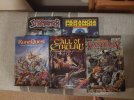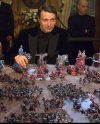McDeath
Pubber
- Joined
- Nov 30, 2021
- Messages
- 12
- Reaction score
- 90
My own B-OSR journey started with the Warlock of Firetop Mountain, which I read aged 11 after playing D&D for a year or so. It was a complete eye opener – a simple yet hugely immersive experience, elevated by Russ Nicholson art that inspired and terrified. From then on, I became an avid Fighting Fantasy collector, with the Sorcery series being a particular highlight. Magazines followed – Warlock, Proteus, as well as other gamebook series including Lone Wolf, Way of the Tiger and Grailquest.
Around that time, I also picked up Imagine Magazine. Mature and literate, it treated my supposed kids’ hobby as a worthwhile adult pursuit that could be analysed and expressed in new ways. I devoured Pelinore setting material along with historical and literary themed articles. In addition to some outstanding content, it switched me on to TSR UK’s output, including the well-regarded U and UK module series and standalones like B10: Night’s Dark Terror, which remains one of my favourite published adventures.
Parallel to this was my growing infatuation with Games Workshop and their anarchic, post-punk attitude. Citadel miniatures were producing figures that, whilst certainly fantastical, felt grounded in the mud, blood and grit I increasingly associated with British aesthetics of lived-in worlds and dodgy protagonists. Warhammer Battle provided rules for flinging these ne’er-do-wells at each other en masse, with awesome scenario packs like Bloodbath at Orc’s Drift. Terror of the Lichemaster and the stellar McDeath. The early Citadel Compendiums, with their illustrated depiction of models, read like a combination of style guide and monster manual for the discerning British gamer. The revelation was, of course, WFRP, which felt like the culmination of everything that went before. The best gaming experiences of my life sprang from that iconic tome.
I’m banging on a bit now, but there’s so much more I could talk about. Dragon Warriors, Maelstrom, the subversive inspiration that was early White Dwarf. All this informed my development as a gamer, and maybe even as a person. Like all old gits looking backward, I get misty eyed. It felt like a great time to be in the hobby.
It’s also heartening to see that the spirit of that time is alive and well and finding expression in games like Warlock, Warpstar, Crypts & Things, etc, all of which wear their B-OSR inspirations on their sleeve. Elsewhere, Advanced Fighting Fantasy continues the tradition of Titan and associated books, whilst WFRP has a relatively new edition that has re-issued the Enemy Within as a complete and revised campaign. Times have changed enormously since I first picked up WoFM, but this particular branch of the hobby is still bearing fruit, and for that I am glad.
Around that time, I also picked up Imagine Magazine. Mature and literate, it treated my supposed kids’ hobby as a worthwhile adult pursuit that could be analysed and expressed in new ways. I devoured Pelinore setting material along with historical and literary themed articles. In addition to some outstanding content, it switched me on to TSR UK’s output, including the well-regarded U and UK module series and standalones like B10: Night’s Dark Terror, which remains one of my favourite published adventures.
Parallel to this was my growing infatuation with Games Workshop and their anarchic, post-punk attitude. Citadel miniatures were producing figures that, whilst certainly fantastical, felt grounded in the mud, blood and grit I increasingly associated with British aesthetics of lived-in worlds and dodgy protagonists. Warhammer Battle provided rules for flinging these ne’er-do-wells at each other en masse, with awesome scenario packs like Bloodbath at Orc’s Drift. Terror of the Lichemaster and the stellar McDeath. The early Citadel Compendiums, with their illustrated depiction of models, read like a combination of style guide and monster manual for the discerning British gamer. The revelation was, of course, WFRP, which felt like the culmination of everything that went before. The best gaming experiences of my life sprang from that iconic tome.
I’m banging on a bit now, but there’s so much more I could talk about. Dragon Warriors, Maelstrom, the subversive inspiration that was early White Dwarf. All this informed my development as a gamer, and maybe even as a person. Like all old gits looking backward, I get misty eyed. It felt like a great time to be in the hobby.
It’s also heartening to see that the spirit of that time is alive and well and finding expression in games like Warlock, Warpstar, Crypts & Things, etc, all of which wear their B-OSR inspirations on their sleeve. Elsewhere, Advanced Fighting Fantasy continues the tradition of Titan and associated books, whilst WFRP has a relatively new edition that has re-issued the Enemy Within as a complete and revised campaign. Times have changed enormously since I first picked up WoFM, but this particular branch of the hobby is still bearing fruit, and for that I am glad.












